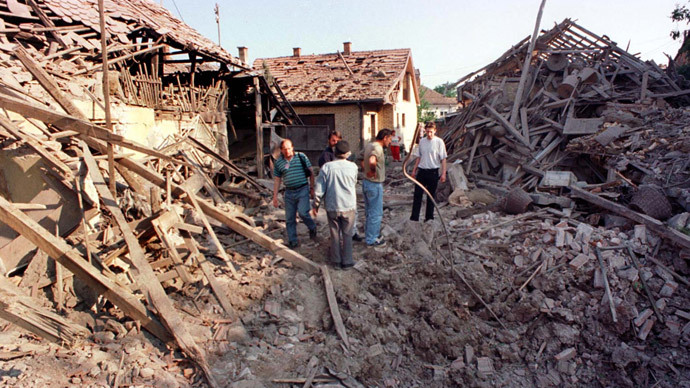$100bn NATO claim: Serbian NGOs seek compensation for Yugoslavia bombing

Two non-governmental organizations have said NATO should be required to pay compensation for the massive damage inflicted during the 1999 bombing campaign against Yugoslavia.
A meeting of the Belgrade Forum for the World of Equals and the
Club of Generals and Admirals in Belgrade presented an initiative
to hold 28-member NATO financially accountable for the damage
that Yugoslavia sustained in the attacks.
Serbian experts put the price tag of the devastation between $60
and $100 billion.
Retired General Jovo Milanovic said that NATO’s military
offensive, which was unsanctioned by the United Nations,
represented "a violation of all norms of international law
that caused enormous material damage to Yugoslavia and huge human
casualties,” Tass quoted him as saying.
The participants supported Milanovic’s proposal to pursue the
legal options involving financial compensation, as well as the
possibility of opening criminal proceedings against western
leaders who expressed their support for the aerial attacks.
Sixteen years ago, between March 24, 1999, and June 10, 1999,
NATO aircraft flew over 38,000 combat missions in Yugoslavia,
mostly concentrated on the capital Belgrade and in Kosovo, the
flashpoint of the conflict.
Using fighter jets as well as long-range cruise missiles from
warships in the Adriatic Sea, NATO destroyed vital strategic
infrastructure, including bridges, government buildings and
factories. The NATO campaign also targeted critical civil
infrastructure, including power plants and water-processing
facilities, causing substantial environmental and economic damage
to the country.
READ MORE: US military convoy parades through Eastern Europe (VIDEOS)
On May 7, NATO forces bombed the Chinese Embassy in Belgrade, killing three Chinese journalists. Washington and NATO apologized for the bombing, blaming it on an “outdated map” provided by the CIA.
The NATO campaign resulted not just in the destruction of
infrastructure but the death of hundreds of civilians as well.
Human Rights Watch reported that “as few as 489 and as many
as 528 Yugoslav civilians were killed in the 90 separate
incidents” in the US-led NATO campaign.
Serbian sources report a much higher fatality rate, saying more than 2,000 civilians and 1,000 servicemen were killed in the NATO bombardments, while more than 5,000 people were wounded and over a thousand went missing.













